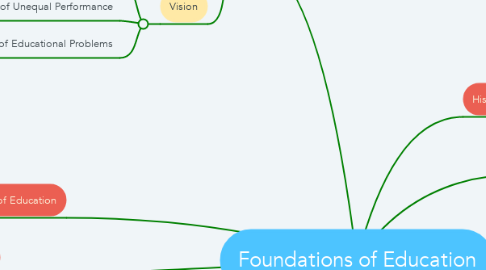
1. Politics of education
1.1. Purposes of Education
1.1.1. 1. The Intellectual Purpose
1.1.1.1. teach basic cognitive skills
1.1.2. 2. The Political Purpose
1.1.2.1. teach the basic laws of society
1.1.3. 3. The Social Purpose
1.1.3.1. help solve social problems
1.1.4. 4. The economic Purpose
1.1.4.1. prepare students for their occupation
1.2. Vision
1.2.1. 1. The Role of The School
1.2.1.1. Radical Perspective
1.2.2. 2. Explanations of Unequal Performance
1.2.2.1. Liberal Perspective
1.2.3. 3. Definition of Educational Problems
1.2.3.1. Conservative Perspective
2. Philosophy of Education
2.1. Generic notions
2.2. Goal of Education
2.3. Role of Teacher
2.4. Method of Unstuction
2.5. Curriculum
3. Schools as Organizations
3.1. Board of Education
3.2. Superintendent
3.3. Senators
3.4. Representatives
3.5. State Board of Education
3.6. 1. School Process: The conflict between teachers and students
3.7. 2. School Cultures:
4. Curriculum, Pedagogy, and the Transfer of knowelwdge
4.1. The Developmentalist curriculum in which students needs are more important than the society.
4.2. The Mimetic: purpose of education is to teach specific knowledge to students.
4.3. The Transformative: purpose of education is to allow the student to grow in various ways.
5. Educational Reform and School Improvement
5.1. School-to-Work: allows students to explore various types of careers.
5.2. Teacher quality: recruiting teachers that is considered to be high quality.
5.3. Full Service and Community Schools
6. History of U.S
6.1. Opposing to Public Education
6.1.1. 1. Elementary School became popular
6.1.2. 2. Congress passed the Morrill Act
6.1.3. 3. Universities were established
6.2. The Democratic-Liberal School
6.2.1. 1. Believes in equality and excellence
6.2.2. 2. Believes schools are flawed
7. The Sociology of Education
7.1. Relationship between School and Society
7.1.1. 1. Functionalism
7.1.1.1. Everything serves a function
7.1.2. 2. Conflict Theory
7.1.2.1. Competition of power
7.1.3. 3. Internationalism
7.1.3.1. Non-verbal communication and envirionment of classroom
7.2. The Effects of Schooling on Indiviuals
7.2.1. 1. Teacher Behavior
7.2.2. 2. Student Peer Groups and Alienation
7.2.3. 3. Employment

